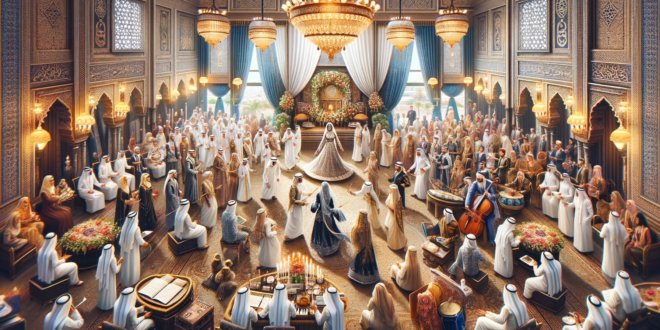The Significance of Family and Community in Arab Weddings Arab weddings are grand celebrations where family and community play a central role. These events are not just about uniting two individuals but also about bringing together two families and their communities. Guests can expect a warm and inclusive atmosphere, where family bonds and community ties are celebrated and strengthened.
Traditional Ceremonies and Customs One can expect to witness a range of traditional ceremonies and customs at an Arab wedding. These often include the Katb al-Kitab or marriage contract signing for Muslim weddings, and similar rituals in Christian and other Arab weddings. Each ritual holds deep cultural and religious significance, reflecting the rich heritage of the Arab world.
Extravagant Celebrations and Lavish Decor Arab weddings are known for their extravagant celebrations and lavish decor. Guests can expect beautifully decorated venues, often with luxurious details and opulent themes. From floral arrangements to intricate lighting, every aspect of the decor contributes to a festive and grand atmosphere.
The Importance of Music and Dance Music and dance are integral parts of Arab weddings. Guests should be prepared for a lively celebration with traditional music, often featuring live bands or DJs. Dancing is a major highlight, with traditional dances like the Dabke in Levantine weddings or the Ardah in Gulf weddings, where guests often join in.
Sumptuous Feasts and Traditional Cuisine Arab weddings are known for their sumptuous feasts, featuring a variety of traditional cuisines. Guests can expect a lavish spread of dishes, ranging from mezze platters to rich main courses, and an array of sweets. These feasts are not just about food but are a way to showcase hospitality and cultural richness.
Elaborate Bridal and Groom Attire The bridal and groom attire at Arab weddings is often elaborate and richly detailed. Brides typically wear ornate gowns, often accompanied by intricate jewelry and accessories, while grooms may wear traditional attire like a Sherwani or Kandura, or a formal suit.
Engagement in Festive Activities and Games Arab weddings may include various festive activities and games, adding an element of fun and engagement for guests. These activities are designed to entertain and often involve playful interaction between the bride and groom’s families, symbolizing the union of two families.
Customs Involving the Exchange of Gifts The exchange of gifts is a customary part of Arab weddings. Guests can expect to see the bride and groom receiving gifts, often including jewelry, clothes, and other valuable items, symbolizing love, support, and blessings from family and friends.
Cultural Sensitivity and Respect for Traditions While attending an Arab wedding, it is important for guests to be culturally sensitive and respectful of traditions. This includes understanding and adhering to dress codes, participating in rituals, and showing respect for the cultural and religious practices observed during the ceremony and celebration.
The Uniqueness of Each Arab Wedding Each Arab wedding is unique, reflecting the diverse cultures and traditions of the Arab world. Guests can expect variations depending on the country, region, and family, making each wedding a unique and enriching experience.
In conclusion, attending an Arab wedding is an immersive and joyous experience, filled with rich traditions, vibrant celebrations, and heartfelt moments. From the lavish decor and lively music and dance to the sumptuous feasts and meaningful ceremonies, Arab weddings are a beautiful reflection of the culture’s deep-rooted values of family, community, and hospitality. Whether you are a close family member or a friend, being part of an Arab wedding is an opportunity to witness and celebrate the beauty and diversity of Arab culture.


